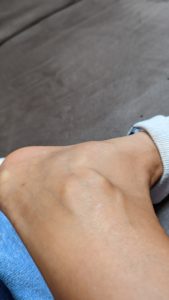IBD and Joint Pain
There are quite a few complications outside of the intestine that can arise as a result of IBD. IBD related arthritis is one of these common complications
Up to 30% of people with IBD may experience arthritis as a result of their IBD. Making it the most common extraintestinal complication.
There is a lot to know about IBD and joint pain, and we will cover
-
What is arthritis?
-
What is IBD arthritis?
-
Different types of arthritis
-
My experience with IBD related arthritis
What Is It?
Arthritis is an umbrella term used to refer to many different diseases. There are more than 100 different types of arthritis. Symptoms include swelling, pain, stiffness and diminished range of motion in joints.
Enteropathic arthritis is the type of arthritis that usually occurs with IBD patients. It most commonly occurs in the large joints of the body including the knees, wrists, and ankles.
Enteropathic arthritis, unlike other forms of arthritis, is non destructive. This means that it does not cause permanent damage to the joints. Unlike rheumatoid arthritis.
Often when inflammation in the digestive tract is back under control, the IBD related arthritis disappears.
This type of arthritis may move spontaneously from one joint to another. And it does not always affect the same joint on both sides.
Types of Arthritis
There are many types of arthritis, including:
-
Enteropathic arthritis
-
Osteoarthritis
-
Rheumatoid arthritis
-
Peripheral Arthritis
-
Reactive Arthritis
-
Ankylosing Spondylitis.
Enteropathy arthritis
Joint problems related to IBD. This is an inflammatory condition.
Osteoarthritis
This is the most common type of arthritis worldwide. It is associated with aging joints that have become damaged overtime. It is caused by the protective cartilage on the ends of bones breaking down. This causes pain, swelling, and movement issues.
Rheumatoid Arthritis.
This is a form of inflammatory arthritis. It is an autoimmune condition caused by the immune system attacking healthy tissue in the joint. This type of arthritis can cause permanent damage to joints.
Peripheral Arthritis
Usually affects the large joints of the arms and legs, including the elbows, wrists, knees, and ankles. The discomfort may be migratory, moving from one joint to another.
Reactive Arthritis
This is arthritis that is caused as a reaction to an infection somewhere in the body.
Ankylosing Spondylitis.
A more severe form of spinal arthritis. It iis a rare complication, affecting between 2% and 3% of people with IBD. It can cause inflammation of the eyes, lungs, and heart valves.
My Experience with IBD and Joint Pain

I was actually diagnosed with Crohn’s disease as a result of having IBD related arthritis.
In 2016 both of my ankles became so swollen that I could not walk. I was literally crawling to the bathroom on my hands and knees.
I was also having an attack of what I thought back then was IBS at the time.
I was forced to go to the hospital to have x-rays taken on both my ankles. My doctor hypothesized that I had somehow, unknowingly, broken both of my ankles.
I knew that couldn’t be true. And after many tests, and blood work, they found that I had elevated CRP levels. Then elevated calprotectin levels in my stool sample. Then inflammation in my GI tract was found through biopsies taken during a colonoscopy.
Since my IBD diagnosis, I have had reactionary arthritis a few times. Each time is has coincided with a flare-up of my IBD symptoms.
I usually experience this swelling in my knees, and ankles. Although I have experienced joint pain elsewhere as well. I have had swelling in my knees and ankles so bad that my joints are visibly swollen, and red
IBD related arthritis has affected my ability to walk, sleep comfortably, and do yoga.
I am currently in a flare, and I am experiencing swelling in my right ankle, and left wrist at the moment. It is painful, but bearable.
I will not take any NSAIDs to manage the pain, as I have experienced that these cause pain in my bowels. And I do not believe that masking pain (unless it is truly unbearable) provides any true benefit to the body.
With around 30% of people with IBD experiencing some form of IBD related arthritis. It is important for us to know about this condition. It is not often talked about by GPs or gastroenterologists.
But having this knowledge can help us to have a better understanding of what is going on with your body, and IBD.
